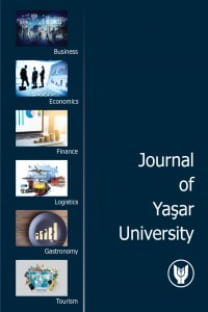TWO SIDES OF THE GLOBALIZATION MEDAL
-
TWO SIDES OF THE GLOBALIZATION MEDAL
Globalization, business, trade, economic liberalization, multinational companies, competition global strategies,
___
- Akın, Bahadır, 21. Yüzyılın eşiğinde Küreselleşme ve Küresel İşletmeler, http://www.bilgiyonetimi.org/cm/pages/mkl_gos.php?nt=262 [Accessed 17.04.2004]
- Aktan, Can, Globalleşmenin Ortaya Çıkardığı Tehlikeler, http://www.canaktan.org/yeni- trendler/globallesme/tehlike.htm#_ftnref3,[Acccessed 16.03.2005]
- Aydemir, Muzaffer (1998), “Küreselleşme, Rekabet ve Sınır-Ötesi Birleşmeler: Daimler
- Benz ve Chrysler Örneği”, Süleyman Demirel Üniversitesi İktisadi ve İdari Bilimler Dergisi, No.3, pp.45-54. Bozkurt, Veysel, Küreselleşme: Kavram, Gelişim ve Yaklaşımlar, http://www.isguc.org/vbozkurt1.htm, [Accessed 16.04.2004]
- Lubber, Ruud, The Dynamic of Globalization, http://www.itcilo.it/english/actrav/telearn/global/ilo/globe/new_page.htm, [Accessed 04.2004]
- DPT (2000), “Küreselleşme”, Özel İhtisas Komisyonu Raporu. Ankara., http://www.dpt.gov.tr, [Accessed 16.11.2003]
- Ercan, Fuat (1995), “Gelişme Yazını, Eleştiriler ve Yeni Perspektifler”, (in: İşgüden, Ercan, Türkay - Ed., Gelişme İktisadı,), Istanbul: pp. 356-357.
- Erdut, Zeki (2002), Küreselleşme Bağlamında Uluslararası Sosyal Politika ve Türkiye, İzmir:
- Dokuz Eylül Yayınları. Gençler, Ayhan, Küreselleşme, Çokuluslu Şirketler ve Sendikalar, Erişim:http://www.isguc.org/arc_view.php, [Accessed 21.11.2003]
- Held,D.; McGrew, A.; Goldblatt D.;Perraton, J. (1999), Global Transformations: Politics,
- Economics and Cultures, Cambridge: Polity Press. http://www.rekabet.gov.tr/word/emel/9.1.Bolum.doc, [Accessed 20.11.2003]
- İpekgil Doğan, Özlem, Kalite Uygulamalarının İşletmelerin Rekabet Gücü Üzerine Etkisi, http://www.sbe.deu.edu.tr/Yayinlar/dergi/dergi04/dogangil.htm, [Accessed 20.11.2003]
- Oksay, Suna, Çokuluslu Şirketler Teorileri Çerçevesinde, Yabancı sermaye Yatırımlarının İncelenerek Değerlendirilmesi, http://bsy.marmara.edu.tr/TR/makaleler/cokuluslu.htm, Accessed 19.11.2003]
- Taştan, Seçil, Küreselleşme ve Küresel Strateji, http://www.insankaynaklari.gokceada.com/makale013.html, [Accessed 19.04.2004]
- William Greider (1997), One World Ready or Not, Touchstone Press.
- ISSN: 1305-970X
- Başlangıç: 2006
- Yayıncı: Yaşar Üniversitesi
TWO SIDES OF THE GLOBALIZATION MEDAL
DOĞU AVRUPA VE BALKANLARDA AMERİKA DESTEKLİ SİVİL TOPLUM DİRENİŞLERİ
BİSİKLET VE OTOMOBİLİN ENERJİ TÜKETİMİ YÖNÜNDEN KIYASLANMASI
ORANLAR ARACILIĞI İLE FİNANSAL DURUMUNUZU NASIL ÇÖZÜMLERSİNİZ? “Küçük İşletmeler İçin Bir Rehber”
Öğr.Gör. Bora AKTAN - Arş. Gör. Bora BODUR , Bora AKTAN, Bora BODUR
AJAN TEMELLİ SİSTEMLER: TEORİK VE PRATİK REHBER
DEVRELERİN KONTROLÜ İÇİN DARBE ÜRETECİ TASARIMI
